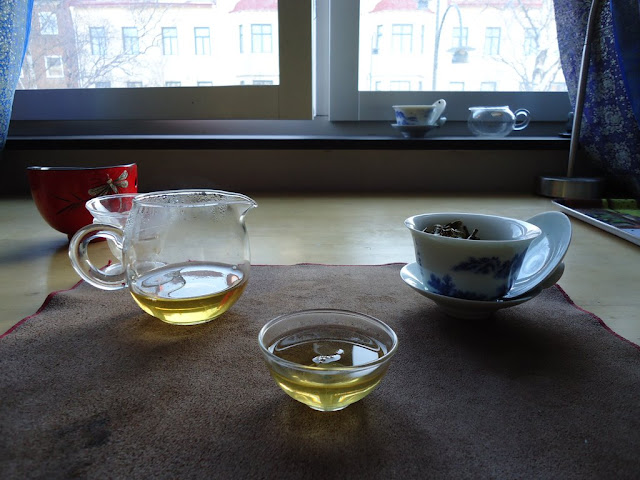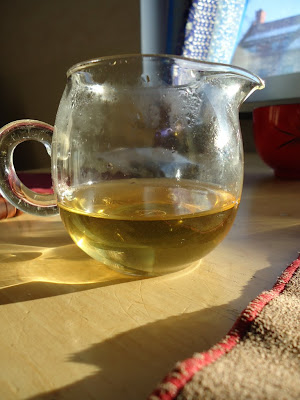Why I love tea
I love tea, I realize it takes a big part of my life. Five years have past since my first contact with unflavored loose leaf tea. I don't feel any addiction to caffeine, but I know the Way of tea is guiding my life. Today, I just asked myself ''why?''. Why do I do all this for a few leaves? Then, I tried to put my arguments on a paper and I ended up with this:
1- It tastes great
This is the most complex non-alcoholic beverage I have come across. Tea can be so diverse, depending on where it grows, how it's been processed, how you brew it... I taste tea in the same way as I enjoy music, I'm a very visual person and I transform what I hear, feel, smell, or taste, into a picture. When I smell tea, I try to imagine in which place I could walk to get the same fragrance: it can be a forest, a wooden house full of flowers with a fireplace in the background, or just a piece of soil, with moss and mushrooms... I can be very imaginative and that's why I love it, drinking tea is good for developing creativity, the more complex the tea, the more stuff in your mental picture.
2- Tea is a very holistic subject
I love science, and studying tea leads you to learn more chemistry, agronomy, environmental science... You get interested in things you'd never thought about, crazy things that can sound useless to most: oxygen 18, ecosystem services, degradation of glyphosate in soil... Because of tea, I'm studying environmental science at university, I love it because I can relate it to something I have seen and that I taste every day.
Tea is also a great source of Culture, maybe the good feeling you have when you're drinking tea pushes people to have crazy philosophical questions and that is how the human thinking moves forward. In China, especially, scholars have a strong relationship with tea. So far, the main cultural improvement tea pushed me to do has been to learn Chinese; I wouldn't have tried if I didn't like tea, but now, I agree it is a very rewarding language. It is useful because you can find Chinese speakers almost everywhere on the planet. It is also enriching due to its large vocabulary: by learning this language, you are introduced new concepts (for example Qi气, Xuwei 虚伪, or the mighty Mei Banfa! 没办法!).
3- Wanderlust
Have you noticed that tea only grows in beautiful countries? China, India, Kenya, Argentina... a real call of the wild. Tea has brought me to China and India, but I'm really looking forward to explore the other producing countries. Studying tea has led me to the most memorable experiences in my life. Exploring a tea area is very much like looking for a treasure, or a hidden Inca tomb: you spend hours in crappy buses, meet very strange people, cross into forbidden areas, have great meals in the countryside, get lost in the jungle, and finally, you reach the tea trees, taste their leaves, and prepare for another trip...
4- Tea is an endless source of learning
One day, a tea master told me that, after 40 years of drinking tea, he was still learning something new everyday. Tea is an incredibly deep subject, as I mentioned before, it includes many side-studies, but there is even more than this...
Tea can be seen from different perspectives, it can be very simple or extremely complex, but in both cases, it is deep. Often, tea masters have two kinds of thinking, they can talk about very accurate and down-to-earth subjects: how tea should be plucked, at which temperature you should fry the leaves if it's raining... but they are also able to simply enjoy a cup of tea, without talking about it. In fact, I am sure a tea master can enjoy a tea bag much more than an Englishman, because one of the things tea teaches you is to be simple. Why is it so?
Learning tea is not a linear process. When learning mathematics, you first learn the addition, in primary school; when you take a PhD in mathematics, you study very advanced things but what you have learned in primary school is still true, in this way, this is a linear learning: the more you learn, the more you know. When it is about tea, I would say it is more of a cyclic pattern: you build up some knowledge, and one day, it is destroyed by a tea you drink or a person you meet, you realize that you were wrong, that you were missing something. Having your past knowledge destroyed is actually an improvement, let's say it's like building a house: you start it with basic materials, expand it and add new floors. One day, it gets too heavy and collapses, but then, you understand better how to build good foundations, you construct it again, using more solid material, expand it, add new floors... until next time it collapses! There goes the way of learning tea, there goes the way of evolution, we learn from what we knew wrong.
This is also why, there should be tolerance among tea amateurs, everybody is a student, and will always be a student. After one year drinking ''fine'' tea, I kind of despised those who drank tea bags and flavored tea. One year later, I realized I was wrong, because the teas I was drinking one year from there were actually of poor quality by my new standards. I must admit that, if on the first time I entered a tea shop, I had been given a Pu-erh tea, I would probably have said I prefer flavored tea bags because they do have a taste and they are not bitter and so on...
Having a blog is cool because you can read what you've written in the past. I hope in five years, I will have a good laugh reading my first articles, that will mean I'll have improved myself. Being tolerant, this is an important thing tea has taught me.
How about you, dear readers, why do you love tea? What does it give you?


